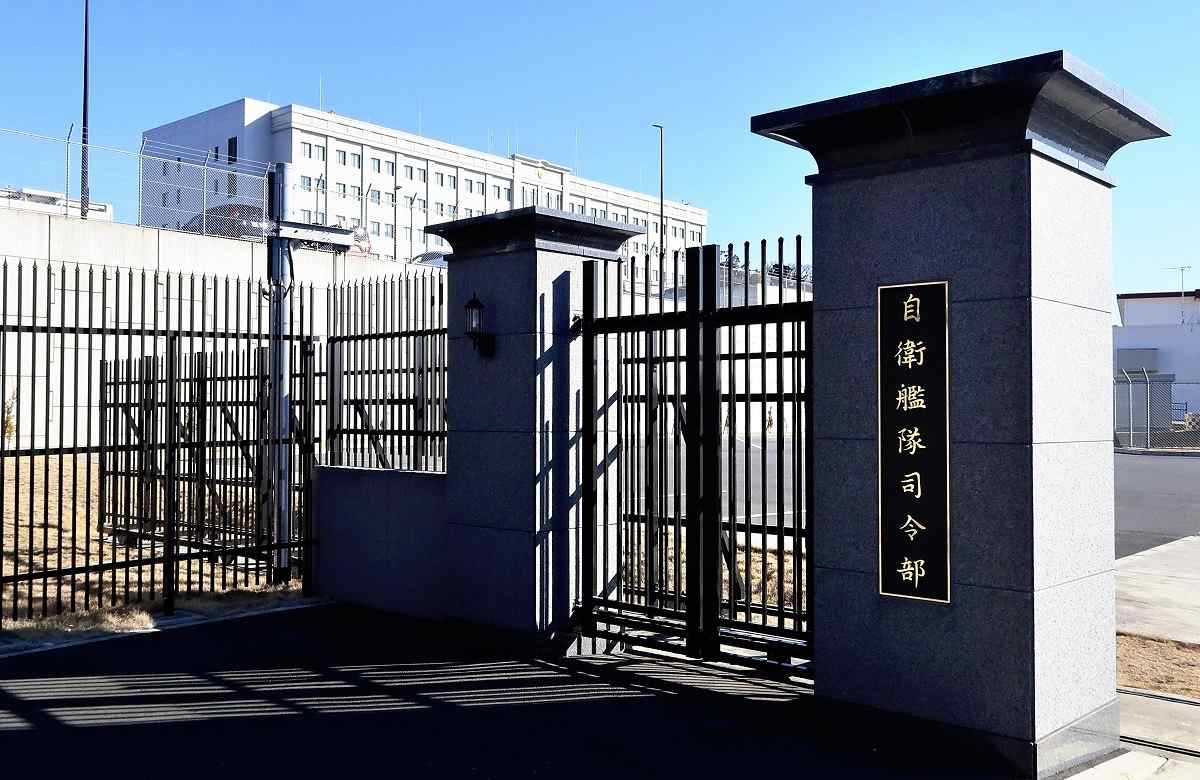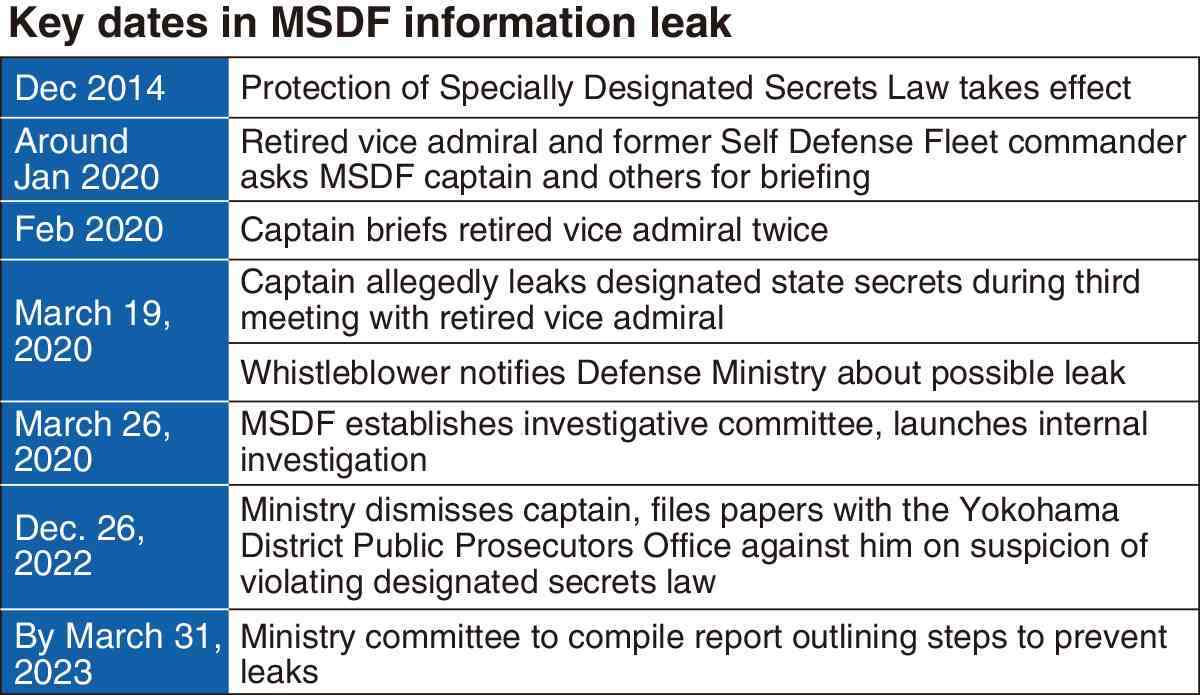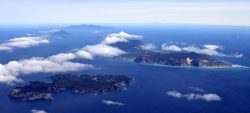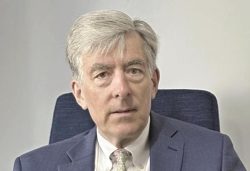
The entrance to the Self Defense Fleet headquarters in Yokosuka, Kanagawa Prefecture, is seen on Feb. 16.
20:00 JST, March 3, 2023
In a room inside a key naval base’s “secure area” where outsiders are prohibited, a then Maritime Self-Defense Force captain and a retired vice admiral were the only people present on March 19, 2020, when the captain allegedly revealed specially designated secrets to his visitor, who had requested a briefing, sources said.
The captain, who was given a disciplinary discharge on Dec. 26, 2022, met the retired vice admiral three times during a brief period in early 2020 to deliver explanations about the nation’s security situation. This communication has raised concerns about the lack of clear boundaries separating active duty and retired Self-Defense Forces officers.
The Defense Ministry plans to review rules covering such interactions before the end of this fiscal year, which runs through March.
The incident unfolded in a room at what is now Fleet Intelligence Command, a strictly guarded facility at Yokosuka Naval Base in Kanagawa Prefecture. The command, the MSDF’s sole entity for collecting military intelligence on areas surrounding Japan, was headed by the captain.
He gave permission for the retired vice admiral to enter the secure area, according to an investigation by the ministry.
According to a senior SDF official, personnel in the area were concerned about the captain meeting with the retired vice admiral behind closed doors. The alleged leak of secret information was uncovered after a report by a whistleblower on March 19, 2020, the day of the third briefing.
“It’s unthinkable that the head of the intelligence unit would meet a retired officer so many times in such a short period to give briefings,” a senior ministry official told The Yomiuri Shimbun.
According to the ministry, retired high-ranking officers are routinely given briefings on the state of affairs, but there are no regulations covering points to keep in mind when handling such situations.
The ministry will establish a committee tasked with considering steps to prevent a recurrence of such leaks.
Suggestions floated so far include restrictions such as prohibiting SDF members assigned to intelligence departments from providing briefings to retired officers.
“Retired SDF officers who held important posts also play a role in explaining security situations and defense policies in simple terms to the public,” said retired Vice Adm. Toshiyuki Ito, currently a professor at Kanazawa Institute of Technology’s Toranomon Graduate School in Tokyo.
“The MSDF compiles materials, based on what information can be made public, for retired officers who provide information to the public,” Ito added. “This information is enough to grasp the state of affairs being discussed. The former captain and the retired vice admiral who reached out to the intelligence unit obviously both bear a heavy responsibility for what allegedly happened.”

Loose lips?
The MSDF has about 43,000 personnel. When the retired vice admiral was on active duty, he was one of only about 20 officers of that rank, the maritime branch’s highest other than admiral. He also ascended to commander in chief of the Self Defense Fleet at the Yokosuka base, meaning he oversaw the operation of the MSDF’s ships and aircraft, as well as the intelligence command.
For a time, the captain had been his subordinate. The captain told the ministry’s investigators that he “had been in awe” of his superior.
According to the ministry, the incident began in January 2020, when the retired vice admiral made a request to the captain and other MSDF officers.
“I have many opportunities to deliver lectures,” the retired vice admiral reportedly told them. “I would like you to give me briefings so that I have accurate information.”
The captain met the retired vice admiral in person twice in February that year and again on March 19. Although the retired vice admiral had not asked the captain to disclose specially designated state secrets, his former subordinate allegedly wanted to offer “as much interesting information as possible.” Allegedly, the captain orally revealed secret intelligence during the third briefing.
According to government sources, this intelligence included details about Chinese military vessel movements that had been collected by the U.S. military and provided to the SDF.
When the SDF’s military police filed papers with the Yokohama District Public Prosecutors Office against the former captain on suspicion of violating the Protection of Specially Designated Secrets Law and other laws, they reportedly attached an opinion that called for the case to be severely dealt with.
The prosecutors office will decide whether to file the first ever indictment for violating the secrets law.
A ministry investigation did not find any evidence that the retired vice admiral had passed sensitive information to a third party.
Prosecutors are expected to determine whether to seek a criminal punishment based on factors including the fact that the captain has been given a disciplinary discharge and consideration of whether there was any specific harm caused by or malice involved in the alleged leak.
‘I didn’t know’
The retired vice admiral to whom a Maritime Self-Defense Force captain allegedly leaked specially designated secrets was interviewed in person twice by The Yomiuri Shimbun in January.
Not yet publicly named by investigators, the retired vice admiral desired the briefings from the captain, who was given a disciplinary discharge in late December.
The following is excerpted from the interviews:
The Yomiuri Shimbun: Have the military police contacted you?
Retired vice admiral: I have not received an explanation from the Defense Ministry [about my being party to the alleged leak], so I don’t know if I am the retired officer involved. [The documents the military police showed me] were heavily redacted. They repeatedly told me that I should be able to remember what happened, but I didn’t know what they were talking about based on that context.
Yomiuri: What type of information did you request in the briefings with the then MSDF captain?
Retired vice admiral: I often have chances to give lectures and speak at other events, and I wanted [information] about topics such as China’s military buildup and joint China-Russia military exercises. I thought meeting about once a month would be enough to get my thoughts in order.
Yomiuri: The now former captain told ministry investigators that the feelings of awe he held toward you motivated him to allegedly leak information.
Retired vice admiral: I don’t deny that I speak sternly when it comes to matters of work. However, I don’t think a person does a good job if intimidated. I didn’t do anything like that.
Top Articles in Politics
-

Japan PM Takaichi’s Cabinet Resigns en Masse
-

Sanae Takaichi Elected Prime Minister of Japan; Keeps All Cabinet Appointees from Previous Term
-

Japan’s Govt to Submit Road Map for Growth Strategy in March, PM Takaichi to Announce in Upcoming Policy Speech
-

LDP Wins Historic Landslide Victory
-

LDP Wins Landslide Victory, Secures Single-party Majority; Ruling Coalition with JIP Poised to Secure Over 300 seats (UPDATE 1)
JN ACCESS RANKING
-

Producer Behind Pop Group XG Arrested for Cocaine Possession
-

Japan PM Takaichi’s Cabinet Resigns en Masse
-

Man Infected with Measles Reportedly Dined at Restaurant in Tokyo Station
-

Israeli Ambassador to Japan Speaks about Japan’s Role in the Reconstruction of Gaza
-

Videos Plagiarized, Reposted with False Subtitles Claiming ‘Ryukyu Belongs to China’; Anti-China False Information Also Posted in Japan


























